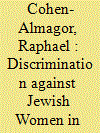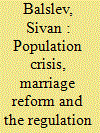|
|
|
Sort Order |
|
|
|
Items / Page
|
|
|
|
|
|
|
| Srl | Item |
| 1 |
ID:
159231


|
|
|
|
|
| Summary/Abstract |
Democracy is supposed to allow individuals the opportunity to follow their conception of the good without coercion. Generally speaking, Israel gives precedence to Judaism over liberalism. This article argues that the reverse should be the case. In Section I it is explained what the Halachic grounds for discrimination against women are. Section II concerns the Israeli legal framework and the role of the family courts. Section III considers Israeli egalitarian legislation and groundbreaking Supreme Court precedents designed to promote gender equality. Section IV analyses inegalitarian manifestations of Orthodox Judaism in Israeli society today, especially discriminatory practices in matters of personal status. It is argued that Judaism needs to adopt gender equality because of Israel’s commitment to human rights. Israeli leaders should strive to close the unfortunate gap between the valuable aims and affirmations voiced in the 1948 Declaration of Independence and the reality of unequal political and social rights for women.
|
|
|
|
|
|
|
|
|
|
|
|
|
|
|
|
| 2 |
ID:
159224


|
|
|
|
|
| Summary/Abstract |
This study sheds light on the causes of failure of economic reform in the Kurdistan Region of Iraq (KRI). It argues that the success of economic reform largely relies on the choices available for ruling authorities as well as their willingness to share power with the people and with each other. Since the birth of the Iraqi state and the KRI the interaction of uncivic traditions, rent seeking, and centralization has been the main cause hindering economic reforms that are desired to sustain development. To investigate, the study provides a comprehensive account of the failure of the region’s past and present economic policies and the sociopolitical structure that supported it.
|
|
|
|
|
|
|
|
|
|
|
|
|
|
|
|
| 3 |
ID:
159226


|
|
|
|
|
| Summary/Abstract |
The Middle East is frequently looked upon from an angle of tribalism.1
1 Philip Carl Salzman, ‘The Middle East's Tribal DNA’, Middle East Quarterly, 15(1) (2008), pp. 23–33; Philip Carl Salzman, ‘Tribes Today: In Anthropology and in the World’, The Journal of the Middle East and Africa, 6(3–4) (2015), pp. 353–365.
View all notes
This is specifically true for Kurdistan,2
2 In this paper, we use Kurdistan to denote the area where Kurdish people live across the four countries Iran, Iraq, Syria and Turkey. We use southern Kurdistan referring to the Kurdish Regional Government (KRG), and Iraqi Kurdistan to refer to the northern part of Iraq, governed by the KRG.
View all notes
with Kurdish people often regarded as the quintessential tribal society.3
3 Fredrik Barth, Principles of Social Organization in Southern Kurdistan (Oslo: Brødrene Jørgensen boktr, 1953).
View all notes
While the concept of tribalism has been considered by a large number of social scientists, and in particular anthropologists, it has remained ambiguous especially in relation to similar concepts such as ethnic groups or nation. While we agree on the importance of tribal affiliation as one of the components of social identity and social organization in the Middle East,
|
|
|
|
|
|
|
|
|
|
|
|
|
|
|
|
| 4 |
ID:
159230


|
|
|
|
|
| Summary/Abstract |
The founding of the Jerusalem Chamber of Commerce, Industry, and Agriculture in 1909 and its short term of activity represent a pioneering and unique attempt at inter-communal cooperation with the purpose of developing the local economy and improving the infrastructures that would support economic expansion and improve the conditions of the local population. The chamber of commerce brought together prominent Muslims, Christians and Jews, both local Ottoman and foreign, who engaged in commerce, industry and agriculture. This all was happening during a time of uncertainty, change and optimism following the Young Turk revolution and the restoration of the constitution in July 1908. The Jerusalem Chamber of Commerce fostered horizontal linkages across religion and ethnicity through Ottoman citizenship and the pursuit of modernist economic and social goals. The discussion details the founding and the activities of the Jerusalem chamber of commerce. Highlighted are the concerns of local businessmen and their plans for infrastructure development and their promotion of better economic regulations. The discussion draws upon eight issues of its bulletin and underscores the unique resources found in the short-lived publication and evaluates their reliability.
|
|
|
|
|
|
|
|
|
|
|
|
|
|
|
|
| 5 |
ID:
159228


|
|
|
|
|
| Summary/Abstract |
The excessive violence that has spread across virtually all of Syria since the 2011 uprising against the regime of Bashar al-Asad has so far prevented a serious debate about feasible solutions. Together with internal power struggles and the intervention of external actors, ideational factors and identity construction are playing a key role in shaping the dynamics of the Syrian conflict. Fear of exclusion in a future order dominated by radical Islamist forces is keeping the minority groups and some secularists close to the regime. However, there are also grounds for cautious optimism: as this paper shows, most actors from the moderate opposition acknowledge the need to take the minorities’ fears seriously and to provide them with guarantees of participation in a future political order, while stopping short of the option of a power-sharing arrangement between community representatives.
|
|
|
|
|
|
|
|
|
|
|
|
|
|
|
|
| 6 |
ID:
159222


|
|
|
|
|
| Summary/Abstract |
Beginning in the early twentieth century, a discourse on population crisis emerged in the Iranian press. Iran, it was argued, suffered from a small and sickly population, and therefore was unable to fully exploit its natural riches and resources. One suggested solution to the problem was a reformation of the traditional model of marriage, making monogamous, age-appropriate marriage the new norm. This was to provide Iran with numerous robust future citizens, the result of healthy and suitable couples. The article presents the process in which fear of population decline led to a change in the perceptions of ‘proper’ male sexuality, of married life and of love in Iran. It shows how this process influenced gender relations and social relations, preserving women’s subjugation within companionate marriage and constructing men of social groups who practised polygamy and child marriage as corrupt and unpatriotic, unlike Western-educated elite men who adopted companionate marriage.
|
|
|
|
|
|
|
|
|
|
|
|
|
|
|
|
| 7 |
ID:
159229


|
|
|
|
|
| Summary/Abstract |
The historiography of Pahlavi Iran has been unduly influenced, in the words of Cyrus Schayegh, by ‘a methodological statist’ paradigm based on the assumption that the state, dominating society, strove to implement radical Westernization while society’s role was passive and reactive—and that society did not exercise substantial influence on Pahlavi policy-making, in particular during the period covered here, 1967–1979. Consequently, a large gap between state and society emerged and in 1979 the monarchy was overthrown. This article argues that this paradigm needs revision given its inadequate attention to the changes the shah made in the state’s discourses on Westernization and Iranian authenticity and national identity in response to a growing societal and intellectual backlash to Pahlavi Westernization. The Rastakhiz Party and its publications played the key role in this emerging Pahlavi anti-Westernism. The article shows that these changes were more substantial and impactful on the state’s discourses on national identity and the West than has been assumed by existing literature.
|
|
|
|
|
|
|
|
|
|
|
|
|
|
|
|
| 8 |
ID:
159223


|
|
|
|
|
| Summary/Abstract |
The objective of this study is to understand the shift in the nuclear policy of the Islamic Republic Revolutionary Guards (IRGC). As a military organization considered to be the steward of the nuclear programme, the Revolutionary Guards turned into spoilers on the few occasions when the pragmatists in Iran tried to negotiate a deal with the international community. In a surprising shift, the Guards’ nuclear policy changed and supported nuclear negotiations and the nuclear agreement. It is assumed that the IRGC is more interested in its economic ventures than in promoting the nuclear project. To test the hypothesis, the present study is designed to provide a rigorous empirical examination of the economic impact of the sanctions on the Revolutionary Guards.
|
|
|
|
|
|
|
|
|
|
|
|
|
|
|
|
| 9 |
ID:
159227


|
|
|
|
|
| Summary/Abstract |
This article compares the evacuations of the two port cities of Gaza and Jaffa in southern and central Palestine, respectively, by their civilian population on the orders of Cemal Pasha, the Ottoman commander of the Syrian front, during the spring of 1917. While these evacuations are usually regarded as mutually exclusive events, they were in fact part of the same process. We claim that the general evacuation order for two of the main coastal cities of Palestine was driven by the exigency of war and military considerations, rather than by political motivations such as the desire to destroy Zionism or take revenge against the Arab population. This view does not negate the exceptionality of each case but rather aims to better contextualize them within the larger framework of civilian affairs in the region and the Empire at large during WWI. For this purpose we analyse a 17-page enciphered Ottoman telegram that sheds new light on the rationale and the execution of the evacuation of populations in Palestine and compare it to other controversial events in Greater Syria during the war.
|
|
|
|
|
|
|
|
|
|
|
|
|
|
|
|
| 10 |
ID:
159225


|
|
|
|
|
| Summary/Abstract |
According to the classic rentier state theory literature, the political activity of Kuwaiti merchants effectively ceased after the government acquired oil rents. More recent works explain business alliances with the government through the competition for resources between the capitalist class and the population at large. This article argues that the merchants’ political position vis-à-vis the ruling powers has not been consistent and has shifted between ‘voice’ and ‘loyalty’. To explain the choice of political action by the Kuwaiti business community the article compares the merchants’ role in two major contentious events—the popular uprising of 2011 and the 1989 pro-democracy movement. Despite the similarities between them, in 1989 prominent business figures were in the vanguard of opposition, while after 2011 they chose to re-emerge as government allies. The comparison suggests that the shift from ‘voice’ to ‘loyalty’ can be explained by the changing political field. I contend that the rise of new social forces and new types of political opposition antagonized business and forced it to side with the government in order to pursue its vital rent-seeking interests.
|
|
|
|
|
|
|
|
|
|
|
|
|
|
|
|
|
|
|
|
|